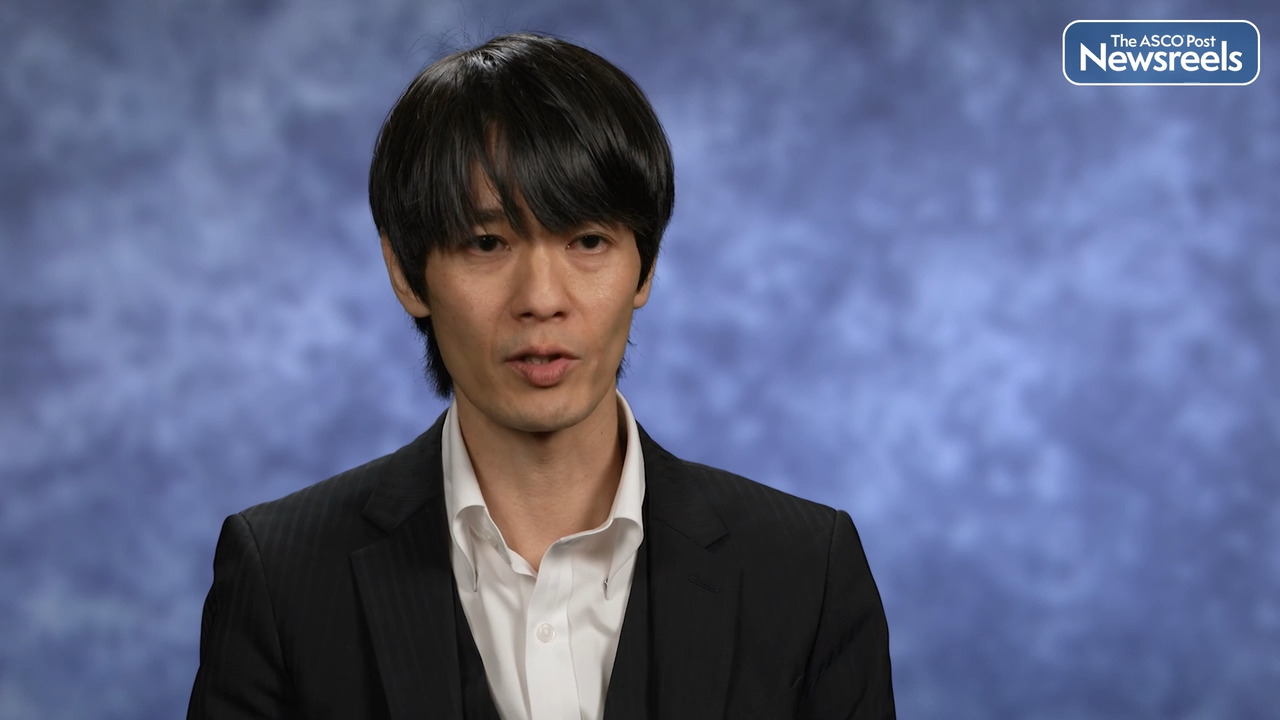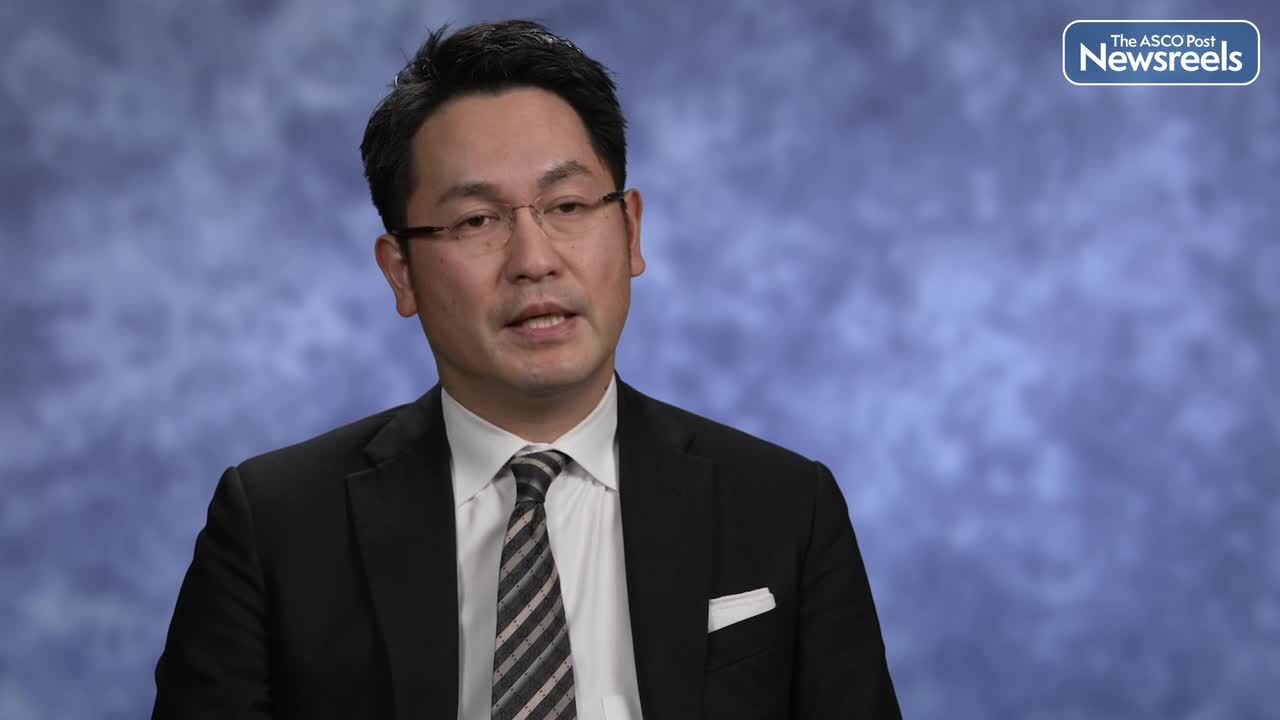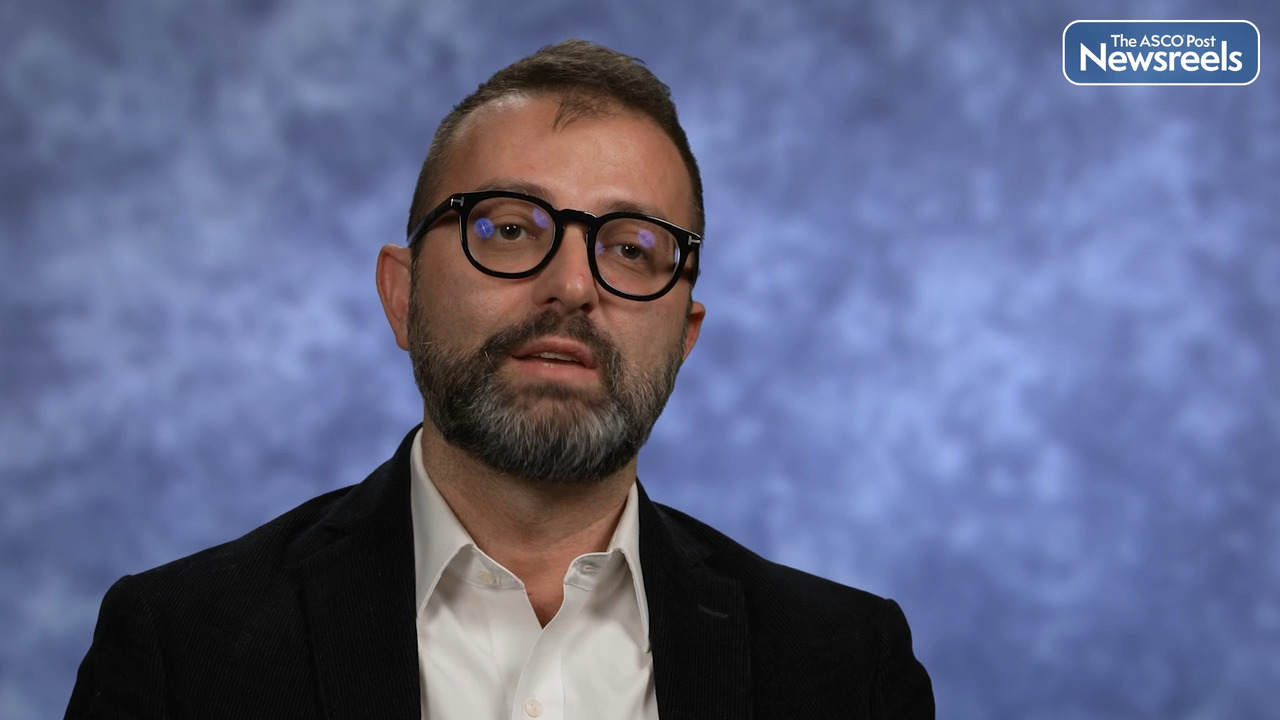Fruquintinib Plus Paclitaxel as Second-Line Treatment for Gastric or Gastroesophageal Junction Cancer
The combination of fruquintinib and paclitaxel is a potential new second-line treatment for patients with advanced gastric or gastroesophageal junction cancer, according to data presented during the ASCO Plenary Series: February 2024 Session (Abstract 438780). Results of the phase III FRUTIGA...
Ian Chau, MD, on Gastrointestinal Cancers: Real-World Effectiveness of Nivolumab Plus Chemotherapy
Ian Chau, MD, of The Royal Marsden Hospital, discusses reportedly the first study to evaluate the real-world effectiveness of nivolumab as a first-line treatment of advanced gastric, gastroesophageal junction, or esophageal adenocarcinoma. The combination therapy improved overall survival compared with chemotherapy alone. Dr. Chau presents the 18-month follow-up results (Abstract 295).
Yasunobu Ishizuka, MD, on Gastric Cancer: Does Nivolumab Infusion Time of Day Matter?
Yasunobu Ishizuka, MD, of Japan’s Aichi Cancer Center, discusses study results showing that scheduling infusions of nivolumab monotherapy before mid-afternoon for patients with metastatic gastric cancer may alter treatment efficacy. Several studies have suggested that circadian rhythm is essential in immune system function, including anticancer immunity (Abstract 268).
Lorraine A. Chantrill, PhD, MBBS, on Gastrointestinal Neuroendocrine Carcinomas: First-Line Treatment With Nab-Paclitaxel Plus Carboplatin
Lorraine A. Chantrill, PhD, MBBS, of Australia’s Wollongong Hospital, New South Wales, discusses phase II findings on the combination of nab-paclitaxel plus carboplatin as a first-line treatment for patients with gastrointestinal neuroendocrine carcinomas. According to Dr. Chantrill, this regimen appears to be active in these tumors and warrants further evaluation in a phase III trial (Abstract 589).
Anant Ramaswamy, DM, on Advanced Gastric Cancers: New Findings on Adding Docetaxel to Doublet
Anant Ramaswamy, DM, of Tata Memorial Centre, discusses phase III results of a study that added docetaxel to a doublet regimen of fluorouracil or capecitabine and oxaliplatin, which did not improve overall survival in patients with advanced gastroesophageal junction and gastric cancers. Continuing chemotherapy beyond 6 months also did not appear to improve survival in this population (Abstract LBA248).
Additional Analysis of MATTERHORN Confirms Global Benefit of Durvalumab Plus FLOT in Gastric/Gastroesophageal Junction Cancer
Subgroup analyses of the randomized double-blind phase III MATTERHORN trial continue to show the benefit of adding perioperative durvalumab to standard chemotherapy in patients with locally advanced, resectable gastric or gastroesophageal junction cancer. Detailed findings on pathologic complete...
Perioperative Pembrolizumab Plus Chemotherapy in Locally Advanced Gastric/Gastroesophageal Cancer
As reported in The Lancet Oncology by Kohei Shitara, MD, and colleagues, interim analyses of the phase III KEYNOTE-585 trial have shown that the addition of perioperative pembrolizumab to chemotherapy improved pathologic complete response, but did not significantly improve event-free survival, in...
Expert Point of View: Elizabeth Smyth, MD
ASCO discussant Elizabeth Smyth, MD, a consultant medical oncologist at Oxford University Hospitals National Health Service Foundation Trust in the United Kingdom, commented on the EDGE-Gastric trial. This regimen, which evaluated dual checkpoint blockade with next-generation agents, aims to...
Early Data Show Novel Immunotherapy Regimen May Improve Outcomes in Advanced Gastric Cancer
Initial findings from the global phase II EDGE-Gastric trial indicate the potential for two novel immune checkpoint inhibitors to improve outcomes in advanced gastroesophageal adenocarcinoma. The findings were reported at the November 2023 ASCO Plenary Session by Yelena Y. Janjigian, MD, Chief of...
Investigational Dual PD-1 and TIGIT Blockade in Advanced Gastroesophageal Cancer
Early findings from the phase II EDGE-Gastric trial indicate the potential for two novel agents to make a difference in advanced gastroesophageal adenocarcinoma, according to findings reported at the ASCO Plenary Series: November 2023 Session by Yelena Y. Janjigian, MD, Chief of the...
FDA Amends Pembrolizumab’s Gastric Cancer Indication
On November 7, the U.S. Food and Drug Administration (FDA) revised the existing indication of pembrolizumab (Keytruda) in combination with trastuzumab, fluoropyrimidine, and platinum-containing chemotherapy for the first-line treatment of patients with locally advanced unresectable or metastatic...
Novel Antibody-Drug Conjugate Shows Potential in Treating CLDN18.2-Positive Gastric and GEJ Cancers
A first-in-class, claudin 18.2 (CLDN18.2)-targeted antibody-drug conjugate may be a new treatment option for patients with advanced gastric/gastroesophageal junction (GEJ) cancers, according to data presented by Xu et al during the ASCO Plenary Series: November 2023 Session (Abstract 434420)....
Adding Pembrolizumab to Trastuzumab and Chemotherapy in HER2-Positive Gastric/Gastroesophageal Junction Adenocarcinoma: KEYNOTE-811
In interim analyses from the phase III KEYNOTE-811 trial reported in The Lancet, Yelena Y. Janjigian, MD, and colleagues found that the addition of pembrolizumab to trastuzumab and chemotherapy in first-line treatment of patients with locally advanced or metastatic HER2-positive...
Adding HIPEC to Cytoreductive Surgery in Gastric Cancer With Synchronous Peritoneal Metastases
As reported in the Journal of Clinical Oncology by Rau et al, the German phase III GASTRIPEC-I trial showed no improvement in overall survival with the addition of hyperthermic intraperitoneal chemotherapy (HIPEC) to cytoreductive surgery in patients with gastric cancer and synchronous peritoneal...
Addition of First-Line Pembrolizumab to Chemotherapy in HER2-Negative Advanced Gastric Cancer
As reported in The Lancet Oncology by Sun Young Rha, MD, and colleagues, the phase III KEYNOTE-859 trial has shown that the addition of first-line pembrolizumab to chemotherapy was associated with a statistically significant improvement in overall survival in patients with HER2-negative advanced...
Perioperative Chemotherapy and Pembrolizumab in Locally Advanced Resectable Gastric and Gastroesophageal Junction Adenocarcinomas
In a phase II trial reported in JAMA Oncology, Manji et al found that perioperative chemotherapy and pembrolizumab showed activity in locally advanced resectable gastric and gastroesophageal junction adenocarcinoma. Study Details Thirty-four evaluable patients were enrolled in the...
Neoadjuvant Immune Checkpoint Blockade May Be Effective Across Multiple Cancer Types
Neoadjuvant immunotherapy may be effective prior to surgery in multiple types of cancers, according to a recent study published by Topalian et al in Cancer Cell. Background Neoadjuvant immune checkpoint blockades have been a rapidly growing area of research and are currently being tested across...
Ambulatory Thromboprophylaxis in Patients With Lung and Gastrointestinal Cancers
In an Australian phase III trial (TARGET-TP) reported in JAMA Oncology, Alexander et al found that ambulatory thromboprophylaxis reduced the risk of thromboembolic events in patients starting systemic therapy for lung or gastrointestinal cancer who were at elevated risk of thrombosis. Study ...
Quality of Life With Nivolumab Plus Chemotherapy in Advanced Gastric/GEJ Cancer or Esophageal Adenocarcinoma
As reported in the Journal of Clinical Oncology, Markus Moehler, MD, and colleagues found that in the phase III CheckMate 649 trial, the addition of nivolumab to chemotherapy was associated with generally better patient-reported health-related quality of life outcomes in patients with advanced...
Updates on Cancer Therapies Under Study From 2023 ASCO Breakthrough
Presented here are some brief summaries of novel therapies under study from the 2023 ASCO Breakthrough meeting in Yokohama, Japan. The subjects range from new observations about a HER2-directed bispecific antibody and systemic treatment of gastric cancer to an option for treating hand-foot syndrome ...
Neoadjuvant FOLFOX vs Chemoradiotherapy in Locally Advanced Rectal Cancer
As reported in The New England Journal of Medicine by Deb Schrag, MD, MPH, FASCO, and colleagues, the phase III PROSPECT trial has shown neoadjuvant FOLFOX (fluorouracil, leucovorin, and oxaliplatin) was noninferior in disease-free survival vs chemoradiotherapy among patients with locally advanced...
Noninvasive Multitarget Stool DNA Methylation Assay in the Early Detection of Multiple Gastrointestinal Cancers
With an estimated 4.8 million new cases and 3.4 million deaths worldwide recorded in 2018, cancers of the gastrointestinal tract account for over one-quarter (26%) of global cancer incidence and over one-third (35%) of all cancer-related deaths. Although the U.S. Food and Drug Administration (FDA)...
Roundup of Abstracts on New Therapies for Gastrointestinal Cancers From ASCO 2023
The 2023 ASCO Annual Meeting featured thousands of abstracts. In addition to our in-depth coverage of pivotal research from the meeting, The ASCO Post highlights the following studies of novel therapies for gastrointestinal cancers. Addition of Anti-TIGIT Agent in Unresectable Liver Cancer In the...
Individual Patient Meta-analysis of Neoadjuvant Chemotherapy and Chemoradiotherapy for Esophageal or GEJ Carcinoma
In a meta-analysis reported in the Journal of Clinical Oncology, Faron et al found that neoadjuvant chemotherapy and chemoradiotherapy were associated with better survival vs upfront surgery in patients with thoracic esophageal or gastroesophageal junction (GEJ) carcinoma. Study Details The study...
Second-Line Trastuzumab, Ramucirumab, and Paclitaxel in Previously Treated Patients With HER2-Positive Advanced Gastric or Gastroesophageal Junction Cancer
In a Korean phase Ib/II trial reported in the Journal of Clinical Oncology, Kim et al found that trastuzumab combined with ramucirumab and paclitaxel showed activity in the second-line treatment of patients with HER2-positive advanced gastric or gastroesophageal junction cancer whose disease...
Robotic-Assisted Resection of Challenging Gastric GISTs May Be Safe and Effective
Robot-assisted resection may be safe and effective at removing difficult-to-reach gastric gastrointestinal stromal tumors (GISTs), according to a novel study published by Lwin et al in the Journal of Surgical Research. Background For gastric GISTs, surgery is the standard treatment option; however, ...
T-DXd in HER2-Positive Advanced Gastric or Gastroesophageal Junction Cancer: DESTINY-Gastric02
In the phase II DESTINY-Gastric02 trial reported in The Lancet Oncology, Eric Van Cutsem, MD, PhD, and colleagues found that fam-trastuzumab deruxtecan-nxki (T-DXd) was active in patients with HER2-positive advanced gastric or gastroesophageal junction cancer with disease progression on or after a...
Perioperative Palliative Care and Health-Related Quality of Life in Patients Undergoing Curative-Intent Surgery for Upper Gastrointestinal Cancers
In a study reported in JAMA Network Open, Aslakson et al found that perioperative surgeon/palliative care team co-management did not improve health-related quality of life vs surgeon team management alone in patients undergoing curative-intent surgery for upper gastrointestinal cancers. Study...
ASCO Issues Clinical Guidance for Treating Gastrointestinal Cancers Amid Acute Drug Shortages
ASCO has issued new clinical guidance for treating patients with gastrointestinal cancers amid a nationwide shortage of carboplatin and cisplatin. The two chemotherapy agents, in extremely short supply, are essential to treating an array of gastrointestinal cancers—such as esophageal cancer,...
Medicaid Expansion Associated With a Reduction in Mortality for Black Patients With Gastrointestinal Cancers
Studies showed that racial minorities experience disparities in access to cancer treatment and survival. In an effort to improve access to care for disadvantaged populations, the Affordable Care Act provided funding to states to expand Medicaid eligibility criteria and provide coverage to...
Specialist Palliative Care for Patients Undergoing Major Abdominal Surgery for Cancer
In a single-center trial reported in JAMA Surgery, Shinall et al found that specialist palliative care did not improve quality of life or survival vs usual care in patients undergoing nonpalliative major abdominal surgery for cancer. Study Details In the trial, 235 patients scheduled for specified...
Association Between Overweight/Obesity and Risk of Gastrointestinal Cancer
Researchers have found that individuals in early and middle adulthood who have a body mass index (BMI) indicating that they have overweight or obesity may be at an increased risk of developing gastrointestinal cancer, according to a new study published by Loomans-Kropp and Umar in JAMA Network...
Risk of Early-Onset Digestive Tract Cancers Among Young Adults With Nonalcoholic Fatty Liver Disease
In a Korean nationwide cohort study reported in the Journal of Clinical Oncology, Park et al found that individuals aged 20 to 39 years with nonalcoholic fatty liver disease (NAFLD) were at an increased risk of developing early-onset digestive tract cancers. Study Details The study included data on ...
First-Line Zolbetuximab Plus mFOLFOX6 in CLDN18.2-Positive, HER2-Negative Advanced Gastric or Gastroesophageal Junction Adenocarcinoma
As reported in The Lancet by Kohei Shitara, MD, and colleagues, the phase III SPOTLIGHT trial has shown significantly prolonged progression-free and overall survival with the addition of the anti–claudin-18 isoform 2 (CLDN18.2) antibody zolbetuximab to mFOLFOX6 (modified leucovorin [or...
Second-Line Liposomal Irinotecan Plus Fluorouracil/Leucovorin in Metastatic Biliary Tract Cancer
In an updated analysis of a Korean phase IIb trial (NIFTY) reported in JAMA Oncology, Hyung et al found that the addition of nanoliposomal irinotecan to fluorouracil and leucovorin significantly improved progression-free survival in patients with metastatic biliary tract cancer with disease...
Endoscopic Surveillance in Patients at Risk for Hereditary Diffuse Gastric Cancer
In a prospective cohort study reported in The Lancet Oncology, Asif et al found that endoscopic surveillance may be an alternative to prophylactic total gastrectomy in patients at risk for hereditary diffuse gastric cancer due to germline CDH1 pathogenic variants. Study Details In the study, 270...
Interaction of H pylori Infection and Germline Pathogenic Variants in Risk for Gastric Cancer
In a Japanese study reported in The New England Journal of Medicine, Usui et al found that Helicobacter pylori infection affected the risk of gastric cancer in patients with predisposing germline pathogenic variants, including variants in homologous recombination genes. As stated by the...
GLOW Trial: Zolbetuximab Plus CAPOX Extends Survival in Gastric Cancer Subtype
First-line treatment with zolbetuximab in combination with capecitabine and oxaliplatin (CAPOX) extended overall survival in patients with claudin-18.2 (CLDN18.2)-positive/HER2-negative locally advanced or metastatic gastric adenocarcinoma, according to results of the GLOW trial reported by Xu et...
Laparoscopy-Assisted vs Open Distal Gastrectomy for Locally Advanced Gastric Cancer: Relapse-Free Survival at 5 Years
As reported in JAMA Surgery by Etoh et al, 5-year follow-up of the Japanese phase II/III JLSSG0901 trial has shown noninferiority in relapse-free survival with laparoscopic-assisted distal gastrectomy vs open distal gastrectomy in patients with locally advanced gastric cancer. Study Details In the...
Elizabeth Smyth, MD, Offers Insight on KEYNOTE-859 Findings
The invited discussant of KEYNOTE-859,1 Elizabeth Smyth, MD, consultant in gastrointestinal oncology at Cambridge University Hospitals NHS Foundation Trust in the United Kingdom, called the findings “practice-changing” but cautioned that better patient selection is needed to optimally apply them....
KEYNOTE-859 Interim Analysis: Overall Survival Benefit for First-Line Pembrolizumab in Advanced Gastric Cancer
Results of the interim analysis of KEYNOTE-859 are in, and they confirm the overall survival benefit of first-line immunotherapy plus chemotherapy in advanced gastric cancer.1 Pembrolizumab plus a fluoropyrimidine- and platinum-containing doublet provided a statistically significant improvement in...
Surgeon-Anesthesiologist Familiarity and Short-Term Outcomes in Complex Gastrointestinal Cancer Surgery
In a Canadian population–based retrospective cohort study reported in JAMA Surgery, Hallet et al found that increased familiarity among surgeon-anesthesiologist dyads—measured by annual number of procedures performed together—was associated with better short-term postoperative outcomes in complex...
Expert Point of View: Breelyn A. Wilky, MD
Discussant of the INTRIGUE abstract, Breelyn A. Wilky, MD, Director of Sarcoma Medical Oncology, Deputy Associate Director for Clinical Research, University of Colorado, Aurora, called the data presented “compelling evidence of the power of ctDNA [circulating tumor DNA] to identify predictive...
INTRIGUE Study: Circulating Tumor DNA Analysis May Predict Optimal Treatment of Patients With GIST
Circulating tumor DNA (ctDNA) analysis of KIT exon mutations may help to predict which second-line therapy is best for patients with advanced gastrointestinal stromal tumor (GIST), according to data presented during the ASCO Plenary Series: January 2023 Session.1 Exploratory analysis of the phase...
KEYNOTE-859 Interim Analysis: Overall Survival Benefit for First-Line Pembrolizumab in Advanced Gastric Cancer
Results of the interim analysis of KEYNOTE-859 are in, and they confirm the overall survival benefit of first-line immunotherapy plus chemotherapy in advanced gastric cancer. Pembrolizumab plus a fluoropyrimidine- and platinum-containing doublet provided a statistically significant improvement in...
Second-Line Bevacizumab Plus FOLFIRI for Advanced Gastroenteropancreatic Neuroendocrine Carcinoma
In a French noncomparative phase II trial (PRODIGE 41-BEVANEC) reported in The Lancet Oncology, Walter et al found that the addition of bevacizumab to FOLFIRI (irinotecan, leucovorin, and fluorouracil) did not appear to improve overall survival in the second-line treatment of patients with advanced ...
Kohei Shitara, MD, on Gastric or Gastroesophageal Junction Adenocarcinoma: Recent Data on Zolbetuximab Plus mFOLFOX6
Kohei Shitara, MD, of Japan’s National Cancer Center Hospital East, discusses the SPOTLIGHT study’s phase III findings on zolbetuximab plus mFOLFOX6 as first-line treatment for patients with the biomarker claudin-18.2–positive and HER2-negative locally advanced unresectable or metastatic gastric or gastroesophageal junction adenocarcinoma. The regimen seems to have led to an improvement in both progression-free and overall survival, with survival benefits also observed across most subgroups. Zolbetuximab plus mFOLFOX6 is potentially a new standard-of-care treatment for this population (Abstract LBA292).
Souya Nunobe, MD, PhD, on Gastric Cancer: 5-Year Follow-up on S-1 Chemotherapy for Stage II Disease
Souya Nunobe, MD, PhD, of Japan’s Cancer Institute Hospital and the Japanese Foundation for Cancer Research, discusses 5-year follow-up results of the phase III OPAS-1 trial, which compared four and eight courses of S-1, a novel oral fluoropyrimidine derivative adjuvant chemotherapy for patients with stage II gastric cancer. These final follow-up findings confirmed the benefit of S-1 and its use for 1 year to treat this population (Abstract 381).
Risk of Subsequent Gastrointestinal Tract Malignancies After Blood or Marrow Transplantation
In a study reported in JAMA Oncology, McDonald et al found that receipt of blood or marrow transplantation (BMT) was associated with an increased risk of subsequent malignant neoplasms of the gastrointestinal (GI) tract. As stated by the investigators, “Survivors of BMT are at increased risk of...
Filippo Pietrantonio, MD, on Gastric or Gastroesophageal Junction Adenocarcinoma: Recent Data on Treatment With Tremelimumab and Durvalumab
Filippo Pietrantonio, MD, of Italy’s Istituto Nazionale dei Tumori, discusses phase II results from the INFINITY trial of tremelimumab and durvalumab as neoadjuvant treatment of patients with microsatellite instability–high (MSI) resectable gastric or gastroesophageal junction adenocarcinoma (GAC/GEJAC). These results open the way to investigate nonoperative management in patients with clinical, pathologic, and molecular complete response after T300/D (300 mg of tremelimumab and 1,500 mg every 4 weeks of durvalumab) (Abstract 358).



